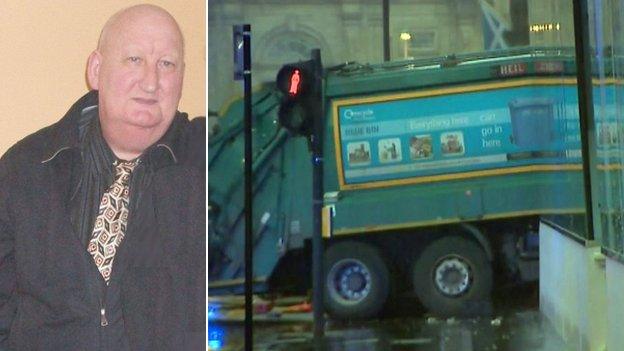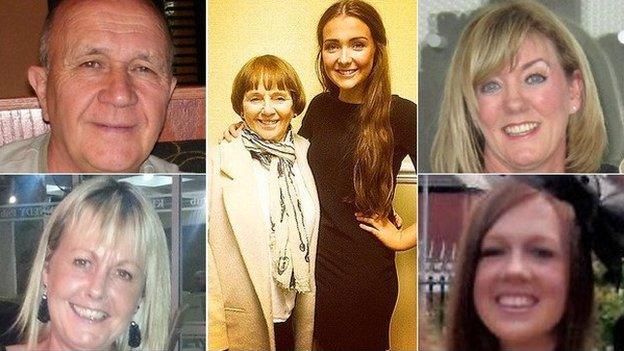Glasgow bin lorry crash: Driver may be tried in England
- Published

The inquiry has heard allegations Mr Clarke lied about his medical history to doctors, the DVLA and his employer
The inquiry into the Glasgow bin lorry crash has heard the driver will not face criminal prosecution in Scotland - but could be tried in England or Wales.
The inquiry into the crash, which killed six people, has heard Harry Clarke, 58, lied about a 2010 blackout in health assessment forms.
Scotland's Crown Office said its decision not to prosecute still stood.
The Driver and Vehicle Licensing Agency (DVLA) could prosecute Mr Clarke for non-declaration on his LGV form.
The chief medical adviser to the DVLA, Dr Wyn Parry, told the fatal accident inquiry (FAI) this was something which was under consideration, but that no decision had been made.
'No charges'
He said it was up to the DVLA to decide if this was an appropriate course of action.
The development emerged after the Crown Office had clarified its decision not to prosecute Mr Clarke.
The Crown Office said in February that there would be no criminal charges against Mr Clarke or his employers over the crash, which it viewed as a tragic accident.
The inquiry has since heard that while employed by First Bus, Mr Clarke blacked out at the wheel of a bus in 2010.

(Clockwise from top left) Jack Sweeney, Lorraine Sweeney, Erin McQuade, Jacqueline Morton, Stephenie Tait and Gillian Ewing were killed in the crash
It has also heard that he subsequently lied about the circumstances of this incident when applying to join Glasgow City Council and in health assessments.
The family of victim Jacqueline Morton called at the weekend for Mr Clarke to be prosecuted.
Newspapers have claimed a private prosecution is now being considered.
On Wednesday, Solicitor general Lesley Thomson, who is leading the FAI, said that the commitment made by the Crown in February that no-one would face criminal charges still stood.
Private prosecution
She said this covered all aspects of Mr Clarke's driving and any false information he had given to doctors, the DVLA and Glasgow City Council about his medical history.
Sheriff John Beckett, who is hearing the FAI, has now asked lawyers acting for the relatives if they can indicate whether they intend to bring a private prosecution against Mr Clarke.
The sheriff said that, while a private prosecution would be very rare, he wanted to be able to warn Mr Clarke before he answers questions as a witness at the inquiry.
If there is a chance of prosecution, the witness could potentially not answer questions put to him as any evidence he gives could be used against him at a future trial.
Sheriff Beckett said: "Normally, if a person is clearly told by the Crown that he will not face criminal proceedings, then he will not face criminal proceedings.
"However, there have been rare instances where private individuals have been allowed to bring a private prosecution in the High Court.
"That is a very rare occurrence, and there are significant procedural obstacles to be overcome before it can occur, so that normally a court might be entitled to assume that if the Crown is committed to a position whereby it cannot prosecute there will be no criminal prosecution."
The sheriff said he did not expect an "immediate answer" on the matter.
The FAI at Glasgow Sheriff Court has been looking at the circumstances which led to the bin lorry veering out of control on Queen Street on 22 December last year.
The vehicle killed six people and injured 15 others before crashing into the Millennium Hotel in George Square.
The inquiry continues.